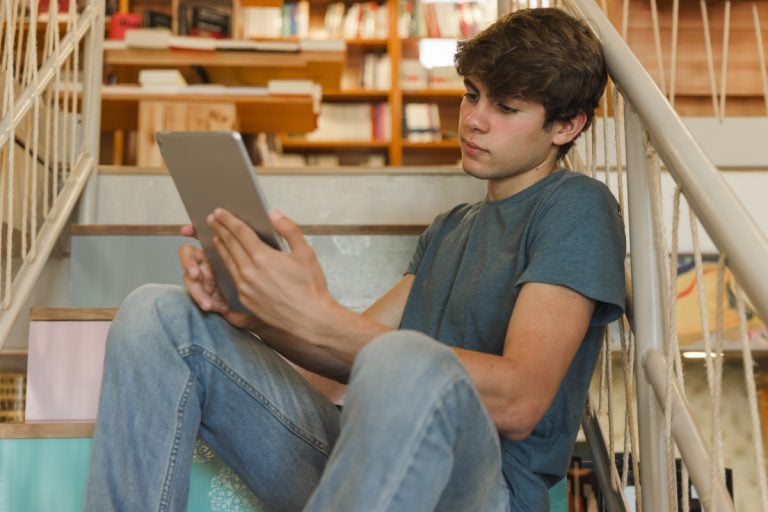Self-paced learning is one of the biggest benefits of online schooling. Yet, we noticed that parents sometimes struggle to understand what that actually means.
Even worse, they instantly build a negative attitude towards it because they think self-paced means their child learns alone. The truth is entirely different.
Benefit of learning at your own pace is that it helps you develop an individual learning style. It leads to a greater memory performance and a better knowledge retention.
What is Self-Paced Learning?
Self-paced learning is an educational approach that allows students to progress through learning materials at a pace that suits their individual needs, ensuring that faster learners are not held back and slower learners are given sufficient time to master concepts.
Take a look at your child.
You can tell what their favorite food is, what kind of clothing they like. Whether they enjoy group activities, or they are more quiet and introverted.
It doesn’t matter if they are five, 12, or 18. Children have certain habits and needs which also apply to how they study.
Each student is an individual for themselves and has a unique style of learning.
Yet, traditional schooling does not allow them to follow that unique style but rather forces them to mold into one style imposed by the school.
At traditional brick-and-mortar schools, children follow the tempo of a group and schedule created by that institution.
Each class lasts 45 minutes, and a teacher follows a pre-prepared learning plan and doesn’t care if a child mastered the material.
A child that can not keep a predetermined pace gets a bad grade. It is a demotivational measure, and we do not see how it can encourage students to learn effectively.
However, we won’t say they need to learn more, because in most cases it is not about the amount of time they study, but how they learn.

Online schooling brought a small revolution and introduced self-paced learning. With this style, a student learns at their own tempo. There are no timetables that limit or oblige them.
This type of learning allows a child to move through the program at their speed.
They can go quicker through material that is easy to understand, or if they cope with something, they can spend as much time as they need to master it.
Let’s say, for example, that your child is very good at math and they can learn the lesson and do daily assignments in half an hour or 45 minutes. However, they are struggling a bit with History and Geography.
Self-paced learning enables them to spend more time on lessons and subjects that are harder to handle.
They would not be falling behind because of that, as they would in a traditional classroom.
If they finalize school assignments earlier, they get more free time.
EduWW’s Learning Management System (LMS), which is a core element of self-paced learning, is a bit different from other schools.
Other than transcripts, videos, or interactive content, EduWW has live real time classes with tutors that aren’t pre recorded.
Students also have the support of these tutors as well as consultants. Tutors and consultants greatly improve the efficiency of the self paced learning model by offering additional help.
Benefits of Self-Paced Learning
There are many aspects that improve the effectiveness of self-paced learning.
Let’s summarize them and explain each one.
No Pressure
Self-paced learning enables students to engage with material at their own pace.
There’s no stress about completing the assignments at the same time as other students or going through lessons too fast or too slow.
Online platform-based learning allows students to review the materials whenever they want.
That means no tension in rushing to quickly get down all the notes.
Flexible Scheduling
A learning schedule is always necessary.
However, in a paced learning environment, students make their own study plan however it fits them.
This type of learning enables students to study when their focus is high, so they’ll have better knowledge retention.
It also helps them find more time for other activities, such as sports, music school, or dancing classes. That can make good time management and discipline practice.
Customization and Personalization
The ability to customize their learning process is one of the greatest self-paced learning advantages students can have.
It gives them the freedom to choose how they will follow their lessons, through transcript, listening, or watching a video.
Adapting the speed, time, and amount of content for learning may give additional motivation to students.
Access
The only things self-paced learning requires are an online connection and a device that can be connected so it can be accessed from all over the world.
That is crucial for kids from remote places to have the best education.
The platform offers 24/7 worldwide support, so students can access the materials and study anytime they choose.
It’s not rare for some students to get left behind in traditional classes for different reasons.
It can be anything from learning difficulties to a student’s individual study needs.
The easily accessible education is an ideal solution for many children who have various difficulties attending traditional school lessons.
Are There Any Cons to Self-paced learning?
Certainly, like all things, it has its cons.
Here are the most notable ones to consider.
Lack of Interaction and Collaboration
Students may feel isolated during paced online schooling, spending most of their time alone on a device, scrolling through the materials.
In contrast, conventional schools offer opportunities for students to interact with classmates and work on group projects, developing social skills.
Motivation Inconsistency
Sometimes, it’s hard to keep the motivation to study, particularly in a self-paced learning mode.
It’s easy for unmotivated students to be distracted and slip out of the study process, especially if they don’t have strong self-discipline and accountability.
Possible Procrastination
Lack of motivation, laziness, and procrastination usually go hand in hand. Without the time structure and constant surveillance, paced learners easily fall behind in school.
So, it’s crucial to build self-discipline and good study habits to avoid it.
Difficult to Receive Feedback
With this type of learning, it’s hard to get immediate progress input and see which areas need improvement. That may make some students feel stuck and unable to move forward with the lessons.
In the K-12 education system, students are usually closely monitored and get immediate reports, because it’s vital to follow young learners’ progress, to make sure they are on the right track of getting the best education.
The Excessive Need for Support
Even though self-paced learning gives students freedom and a chance to master lessons at their own speed, it also requires strong self-discipline.
Without good skills in planning, time management, and keeping track of progress, many students can quickly fall behind.
This is especially true for students with special needs.
For example, according to a Sage Journals study, some students with ADHD or certain learning difficulties may enjoy having fewer distractions and the option to replay lessons.
But others struggle with motivation, feel more isolated, and often lose focus if they don’t have extra support
Studies also show that learning strategies like setting goals, managing time, and checking progress make a big difference in self-paced programs.
Teaching students these skills helps them stay on track and succeed, which is why extra guidance is so important in K-12 self-paced models.
How Does Self-Paced Learning Fit Into Our Online School, EduWW?
Education World Wide offers a K-12 online schooling program that is self-paced. Students learn at their own tempo from Grade 1 to Grade 12.
That, however, doesn’t mean it can last forever. Every time we enroll a student, we have to put an end date to their program.
It is a ten month timeframe in which they have to learn the material and finish the grade.
But, in case they are quick and dedicated learners, they can finish the grade faster. The same goes for those who have difficulties, for whatever reason, they can prolong that 10-months period and finalize the grade, without any consequences.
Our students have non-limited access to the platform and the entire studying material. They can log in anytime they want, 24/7. Therefore they can learn whenever it is convenient for them.
A student does not have a clock ticking above his head to finish the assignment or comprehend the lesson. Since each student creates an individual studying plan, they are free to learn at their own tempo.
EduWW also offers individual and group classes. Dedicated tutors who teach at our online self-paced classrooms keep track of students’ progress, and help them get the best education.
In addition, different student clubs offer students the opportunity to connect with their peers.
Why is Self-Paced Learning Important?
The advantages of self-paced learning is, aside from improving memory performance and increasing knowledge retention, also about teaching students to deal with commitments.
By allowing them to create their own personal schedules for studying, we at Education World Wide created a supportive schooling environment
Once we free students from timetables and time frames in which they have to obtain knowledge, they do not feel the pressure anymore.
Children learn at their own time and their own tempo. They learn faster, and with understanding, which means that they acquire knowledge and remember it easier. Students develop a habit of learning every day. By building these habits and developing personal studying affinities, students have control over the process of learning.
Every student has individual learning habits, and forcing them to go against their routine will have the opposite effect. We do not necessarily say that the system applied in traditional schools is bad. It may be suitable for some children, but not for others.
In other words, this type of learning gives everyone equal opportunities. Therefore, if a student is a fast learner, they can finalize school assignments quicker and enjoy extra free time.
On the other hand, if a student struggles with some material, they can take as much time as they need to master it. By doing that, they won’t feel embarrassed because they are falling behind from the rest of the class. Because they do not learn in a group, they learn individually.
Even though Education World Wide offers online classes, we try to implement the same methodology and respect student’s learning habits.
During individual online classes, a teacher adjusts to a particular student, not the other way around. EduWW’s method of teaching is student centered.
Online group classes serve more as group meetings that allow students to interact with each other. Sometimes a lesson in the class will be a few units ahead of what some students achieved, but that is the moment when the rest of the students who already passed that lesson jump in and help their peers.
Enroll Today!
Education World Wide enables all its students to learn at self-pace and has excellent tutoring support to assist whenever students stumble upon obstacles.
If you want to find out more, do not hesitate to book a consultation with one of our consultants, or simply send us an email with questions to [email protected].



